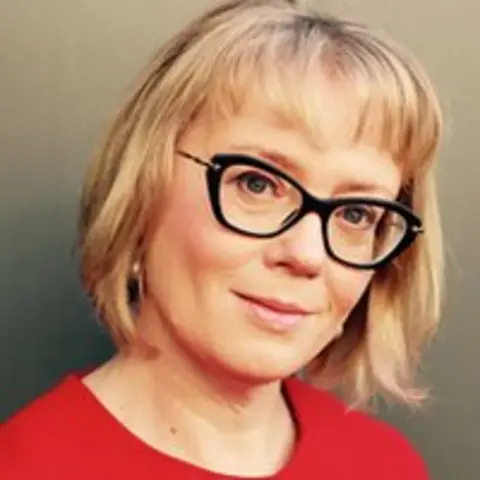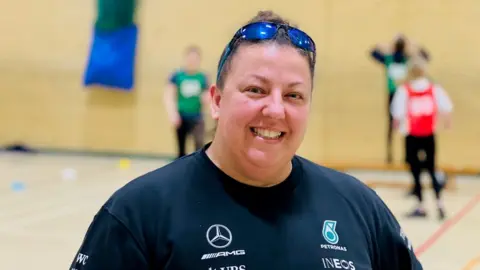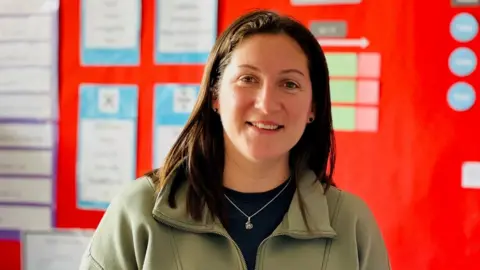PE teachers retraining in maths to fill school gaps

 BBC/Branwen Jeffreys
BBC/Branwen JeffreysSecondary schools in England have told BBC News they are turning to PE teachers to plug gaps in maths, as research warns of teacher shortages.
The government only reached 63% of its target number for new maths teacher trainees this year.
A new report predicts 10 of 17 secondary subjects will not recruit enough trainee teachers next year.
The government said it was offering bursaries to attract "the brightest and the best" in shortage subjects.
The struggle to recruit trainee teachers affects secondary schools most - with maths, physics, computing and languages all below target numbers.
The new analysis, published on Wednesday by the National Foundation for Educational Research (NFER), said teacher shortages had reached a "critical state" - citing pay and workload as crucial factors.
Maths is one of the most pressing challenges because every pupil studies it until the age of 16.
An experienced PE teacher, Jo Gritt, is part of the solution at The Gryphon School, a large secondary in the Dorset town of Sherborne.
Mrs Gritt is usually seen in sports kit with a whistle round her neck, but from September she will be taking a maths class.
The last time she studied maths was at A-level, but this year she has retrained alongside her job after the school got funding as part of a national programme aimed at boosting maths teaching in schools.
She says she finds that PE teachers can build "a different rapport" with students and that she can encourage teenagers who are not confident in maths.
She adds that being honest about the fact that she is learning too has helped her to build up trust with pupils.
"They see the struggles that we have and I'm quite open," she says.
"A couple of times we've Googled the odd problem, just to triple-check we're doing it the right way."
One of her PE teacher colleagues, Laura Rowe, has also taken up the challenge of learning to teach maths - a subject she loved, but stopped after doing her GCSEs.
 BBC/Branwen Jeffreys
BBC/Branwen JeffreysMrs Rowe says the Year 9 top set she is currently teaching keep her on her toes, as they are "exceedingly good at maths".
"So far they've been fab - I think they like being able to challenge me," she says.
"I enjoy sharing my enthusiasm for maths, being able to get back my passion for numbers."
Mrs Gritt and Mrs Rowe will be teaching Year 8 and 9 pupils next year, allowing the full-time maths teachers more time with older pupils preparing for GCSEs.
The aim is for these two experienced teachers to become maths specialists while they gain a skill that gives them more job opportunities.
It is not unusual for schools to offer cash lump sums as a "golden hello" to recruit maths teachers, and they sometimes get poached by other schools for higher salaries.
Jack Worth, from the NFER, says research suggests almost half of schools are using teachers who do not have a degree in maths to teach the subject some of the time - with government data showing that equated to 13% of maths lessons.
Drop in applicants
The report warns there is a risk of a substantial impact on education as non-specialists are used to fill gaps across all subjects with teacher shortages.
"Having a good and fluent subject knowledge is really important in being able to understand that content and communicate it clearly to pupils," he adds.
Anthony Shaw, head of maths at The Gryphon School, says he is "fantastically lucky" to have colleagues retraining to help his department out.
The school is in a beautiful town in the rolling Dorset countryside and has not struggled to recruit until recently.
Head teacher Jim Gower says much has changed from a decade ago.
Then he would get 30 applicants for a geography or history teacher job, 20 for English and 10 for maths.
"I'd say if we go out to advert now with PE [roles], we will still get a number of applicants but geography or history, we are lucky if we get one or two," says Mr Gower.
"Maths - it's unlikely we will get a specialist apply."
He has filled the past few maths teacher vacancies with primary school-trained teachers rather than those with a maths degree or maths teaching specialism.
Another school, in Cheshire, told BBC News that it had no applicants after several rounds of advertising for maths specialists.
It is now renaming the job advert to be "PE and maths" or "PE and science".
 Getty Images
Getty ImagesAnother group of academy schools has said it will offer teachers the option to work a nine-day fortnight from September to compete with the flexibility that so many jobs in other sectors can now offer.
The NFER report also warns teachers are working longer hours, partly due to dealing with behaviour problems and pupils' mental health.
To tackle the teacher shortage, the report recommends a pay rise of at least 3.1% for teachers next year in line with an expected increase in earnings in the wider economy.
With 65% of graduates able to work entirely or partly at home in other industries, it also suggests teachers should be paid an extra 1.8% to compensate for having to be in school every day.
Last year the starting salary for teachers rose to £30,000.
The overall rise was 6.5%, the report says, but experienced teachers' pay this school year is still 12% lower than 2010-11 once rising living costs are taken into account.
This year the government has indicated it expects the pay review body to suggest much lower "sustainable" pay rises.
Two unions representing classroom teachers are holding consultative ballots over pay and formal strike ballots may follow this summer term.
A spokesman for the Department for Education said it was offering bursaries and scholarships of up to £30,000 for chemistry, computing, mathematics and physics teachers.
They added they were "taking steps" to support teachers' wellbeing and ease workload.
